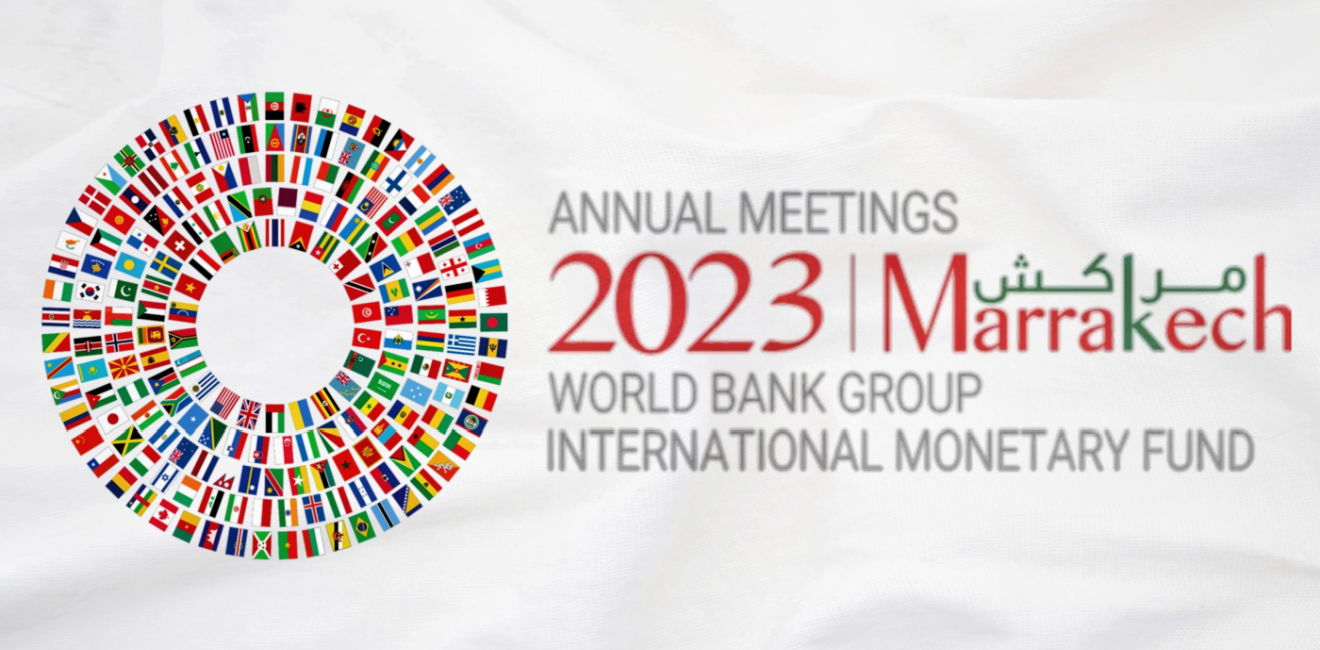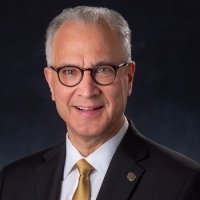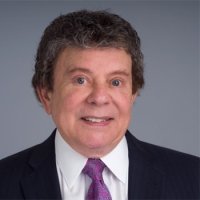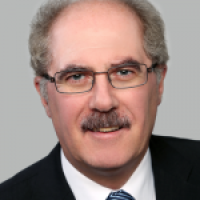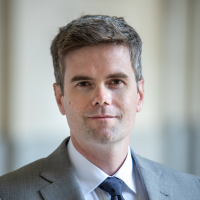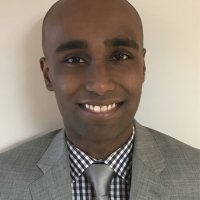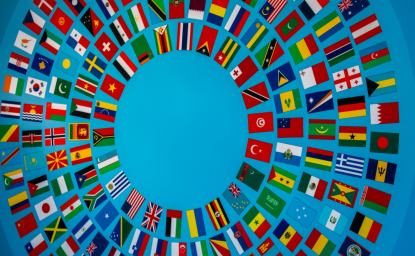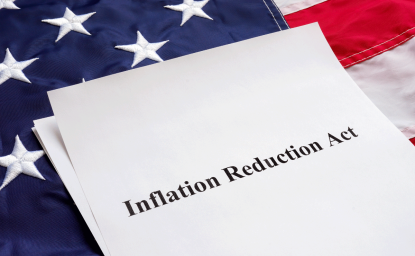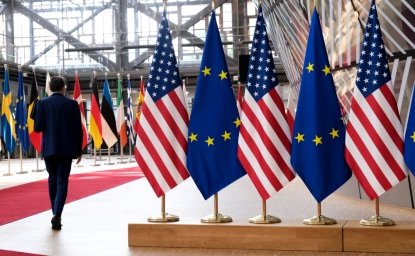Added Climate Focus Should Not Come at Expense of Poverty Alleviation
Mark Kennedy
Wahba Institute for Strategic Competition Director
In recent years, seismic shocks have been unleashed that have disrupted the global economy, particularly for the most vulnerable. The pandemic, economic fallout of Russia’s invasion of Ukraine, climate change, tightening monetary policy, slowdown in world trade, rising protectionism, and an unresolved global debt crisis are felt globally, but most acutely in emerging and developing economies. The World Bank’s recent Global Economic Prospects report forecasts that by the end of 2024, economic activity in these economies is expected to be about 5 % lower than before the pandemic. In more than one-third of the poorest countries, income per head levels in 2024 will be below those of 2019. As the World Bank – IMF annual meeting commences in Marrakech, hopes are high that talk of bolstering the positive impact they provide can be realized.
As Klaus Larres details below, many are looking to the World Bank and IMF to also focus on climate mitigation, pandemic relief, and other global concerns. There seems to be momentum for a new climate-oriented mission statement of “ending poverty on a livable planet.” Yet as Rory Linehan highlights below, “The UN Sustainable Development Goals (SDG) Summit in September confirmed that we are far from on track to achieving the SDGs. In some cases, heartbreakingly, we are even sliding backward.” Without a commensurate increase in financing capacity, many fear that adding a climate focus will only lead to shortchanging efforts to alleviate poverty.
Shifting limited resources available away from development to climate actions would widen the chasm between the rich world and those struggling to feed their children. Poverty and climate change are inextricably linked, yet research confirms that spending on core development priorities alleviates poverty much more and much faster per dollar spent than putting funds toward climate. While those living in comfort might prioritize climate over development, the World Bank’s survey shows that development priorities are of far greater concern among emerging and developing economies. Atop their list is helping will education and workforce development, as Jerry Haar details below. Other priorities include promoting opportunities for economic growth as Prashanth Parameswaran reviews below.
Talk of refusing to fund even natural gas projects abroad as rich countries still get almost 80% of their energy from fossil fuels is viewed as hypocrisy to those without access to energy. In Africa, 600 million people (43% of the total population) lack access to electricity. Over time, batteries will provide an affordable way to balance intermittent renewable energy. Without access to affordable, consistent energy today, it is likely impossible for such nations to achieve significant development progress. Sub-Sahara Africa and Latin America account for only a small sliver of carbon emissions. As Sam Barr outlines below, energy transitions being accelerated by the Inflation Reduction Act and comparable efforts among developed countries hold the potential for greater impact.
There are multiple other vehicles for financing climate action, the Glasgow Financial Alliance for Net Zero (GFANZ), Global Environment Facility, Green Climate Fund, and Just Energy Transition Partnerships, to name but a few. In terms of development financing at scale, the world relies primarily on the World Bank and the other multilateral development banks (MDBs).
Without additional paid in capital, the talk is around the World Bank adding extra lending capacity in the billions, not the trillions needed for global investments to address the United Nation’s Sustainable Development Goals. This difference will only be bridged by significantly increasing the amount of private capital invested in emerging and developing markets to address development and climate. This requires a greater emphasis on activating private investment by MDBs. It also requires making these countries more receptive to private investment. Jeff Kucik makes the case that progress on investor-state dispute settlement procedures can help in this regard.
The world faces many pressing challenges. The World Bank and IMF can and should seek to elevate the impact they apply to these challenges. As they do, adding a focus on climate and other global concerns should not come at the expense of its founding and unfinished goal – alleviating poverty.
On the Path to Reform? What to Expect From the World Bank at its Annual Meeting This Week
Rory Linehan
Wahba Institute for Strategic Competition Global Fellow; G20 Global Infrastructure Hub Director of Engagement
The World Bank is the oldest multilateral development bank (MDB) and the largest (by lending volumes and number of member countries). What happens at the World Bank matters, particularly for poverty alleviation, creating prosperity, and, increasingly, addressing common challenges such as climate change. The World Bank is a vital source of lending, concessional capital, insurance (through its risk mitigation instruments), and technical assistance in emerging markets and developing economies (EMDEs), where there is often no viable alternative to obtaining these resources.
The UN Sustainable Development Goals (SDG) Summit in September confirmed we are far from achieving the SDGs. In some cases, heartbreakingly, we are sliding backward. The same can be said of progress toward Paris climate goals. With multilateralism fraying and the rise in nationalism shifting the global landscape, our world is truly at a crossroads. By reforming and scaling up the mission, vision, and operations of MDBs, key multilateral players aim to place them in a position where they can galvanize the public and private sectors to make progress on big goals, including the SDGs and climate targets.
The MDB reform agenda has been led by the G20, as the premier forum for global economic cooperation. The current Indian G20 Presidency convened an Independent Experts Group to recommend reforms to harness the potential of MDBs. Released earlier this year, the first volume calls on MDBs to triple their mandates, financing, and instruments. In response to the global push for MBD reform, the World Bank released its own Evolution Roadmap to guide conversations on how to reform its mission and vision, including whether the bank should play a larger role in addressing common challenges, such as climate change and pandemic response.
This week’s annual meetings will provide a platform for the World Bank, the IMF, and the G20 to report on their progress toward their reform agendas. There are three key areas to look for from the meeting:
- G20 Finance Ministers and Central Bank Governors Meeting (FMCBG): G20 finance ministers will meet for the final time during India’s G20 Presidency. It will offer them an opportunity to respond to President Biden’s call for a “Bigger, More Effective World Bank” and for G20 members to announce larger mobilization of capital to MDBs.
- G20 High-Level Seminar on strengthening the financial capacity of MDBs: In the margins of the FMCBG, the G20 will push MDBs to innovate to improve their financial capacity. Be on the lookout for announcements on increasing the private capital mobilization capacity of MDBs and initiatives to encourage domestic capital mobilization in emerging markets and developing economies.
- World Bank Reform: In the lead-up to the annual meetings, World Bank President Ajay Banga hinted at reforms we can expect to see in the coming months. They include an updated Evolution Roadmap and a call to broaden the World Bank’s vision for efforts to support a ’liveable planet.’ This week will offer an opportunity for the bank to announce more reforms, including plans to unlock an additional $125 billion (USD ) in lending and the internal restructuring needed to achieve these reforms.
The annual meetings are one milestone on the larger journey of MDB reform. Achieving meaningful change will require continued momentum driven by sustained attention from a coalition of stakeholders. Change is difficult, particularly on a multilateral level. Yet there is reason for hope, with one of Brazil’s three priorities for its G20 Presidency next year “the reform of global governance institutions.” Time will tell if the World Bank and the MDBs can reform quickly and ambitiously enough to support common climate and sustainable development goals.
Human Capital and Workforce—Critical Arenas for the IMF and World Bank
Jerry Haar
Latin America Program and Wahba Institute for Strategic Competition Global Fellow
While there are no limitations on human creativity and on learning and applying the best practices of past successes, the IMF World Bank meetings will once again aim to address challenges surrounding human capital and employment. Solutions to the longstanding problems surrounding these two areas are likely to be variations of previous proposals.
Fostering human capital is critical to developing nations. As the World Bank notes, more than 84% of the world’s workforce lives in developing countries, a share that continues to grow. Africa must generate two million jobs each month by 2040 to meet its growing workforce needs. However, today more than 70% of workers in developing countries work in jobs that often lack financial and job security.
For these nations to advance in our increasingly technological and hyper-competitive world, their governments, private sector, and non-governmental organizations will need to produce significant results. They must upskill and reskill their existing workforce, stimulate entrepreneurship, and emphasize practical job skills. They must also address the needs of women, the disabled, and other under-represented groups (including the indigenous).
Tackling this broad and challenging agenda will be daunting, to say the least. In doing so, policymakers need to keep several things in mind. First, the “workforce” is not a monolith. It comprises the unskilled, semi-skilled, skilled and hyper-skilled. (Custodians, bricklayers, teachers, and computer programmers fall into these categories, respectively.) Macroeconomic policies more heavily impact the first two categories (loose monetary policies that fuel inflation), since they particularly affect pocketbook issues of those groups.
Additionally, for a country to bolster its human capital, it must grapple with the enormous challenges of under-funded and under-performing schools, poorly prepared teachers, and corrupt teacher unions. Nobody should be surprised that the “output” of public schools in developing nations lacks skills necessary to perform on the job at a high level, or to qualify for admission and then graduate from higher education. Similarly, there is an economic and occupational gap between those who can afford private school (and graduate) versus those at public schools.
Accordingly, it behooves multilateral development institutions and policy makers to qualify and support an array of educational providers such as vocational and technical schools, apprenticeship programs, and on-the-job training programs of companies, labor unions, and non-profit organizations.
The World Bank itself is a formidable provider and facilitator of sound initiatives to link and advance human capital and workforce. In Zambia, the Agribusiness and Trade Project increased market linkages and supported the growth of firms in agribusiness. The project improved the ability of emerging farmers and agribusiness small and medium-sized enterprises (SME) to link with larger markets through the immersion in high potential value chains. This led to a 27% increase in average sales of farmers and 73% increase in average sales of SMEs. More than 32,700 farmers and SMEs benefitted from project interventions, and the project mobilized $4.8 billion in private capital.
Be that as it may, supporting human capital and workforce alone is insufficient. Developing nations must simultaneously tackle myriad issues, including infrastructure, regulatory policies, health, access to capital, and public safety. Connecting small informal producers to formal value chains should be another priority.
In the words of Axel van Trotsenburg, World Bank Senior Managing Director:
Creating more and better jobs requires economic transformation: moving workers from lower to higher productivity activities. This shift will need to be led by the private sector, the main engine of job growth.
Tying human capital to the workforce is unquestionably a good place to start.
A Volatile World Is Among the Challenges Facing the World Bank at its 2023 Annual Meeting in Morocco
Klaus Larres
Global Europe Program and Kissinger Institute on China and the United States Fellow
A highly volatile global situation forms the backdrop of the annual meetings of the World Bank and the IMF from October 9-15, 2023, in Marrakesh, Morocco. Intensive geopolitical turmoil in Ukraine, the Indo-Pacific, Israel, and many other locations (including recent turmoil in the Middle East) have shaped much of the supply chain challenges, trade restrictions, and sanction regimes of the past 12 months. This has had a particularly devastating impact on the poor countries in the Global South. Food scarcity, continuing inflation, and high-interest problems remain highly disruptive forces in many countries of the developing world. In the annual meeting’s backyard, much of the destruction in Marrakesh caused by the earthquake in early September has been repaired, but it also highlights the impact of natural disasters as yet another challenge. Globally declining economic growth rates, escalating climate change problems, and not least the economic crises in both the EU (Germany in particular) and China also have had a serious impact. There is no sign yet that as in previous crises, Beijing will resort to a large stimulus program to address the situation.
Simultaneously, a serious political crisis in the US Congress has shaken US politics and threatens to have severe consequences on Washington’s support for international aid and military funding. The US is still the World Bank’s largest shareholder, proposes its president, and holds more than one-third of the voting rights.
Agreement on the objectives of the meetings (whose main theme is “Global Action, Global Impact”) has been more difficult to achieve. There are at least five objectives–most connected with global climate finance–the World Bank should pursue. A breakthrough before the COP27 UN climate summit in early November regarding at least some of these objectives would be highly beneficial.
- The US and a number of other countries, such as Germany, are right in attempting to pursue a substantial reform of the World Bank to make it responsible for other major tasks beyond its main missions: global poverty reduction by means of providing lending facilities, and stimulating economic growth in the developing world. The World Bank should have a role in dealing with global climate change issues and other related issues, such as environmental degradation and a reduction of CO2 output, most notably regarding fossil- fuel powered vehicles and coal power stations.
- The World Bank should expand its lending to developing countries in the Global South for the implementation of development and climate-change policies. Better borrowing terms (or sometimes providing grants) and a focus on clean energy investments are just two of the steps the World Bank could take. It should also consider long-term and low-interest debt instruments to finance clean energy projects.
- The World Bank could also provide loans and/or grants to initiatives and organizations in Global South countries, such as green city initiatives. The World Bank could also become much more active in persuading the private sector to become involved in such green projects (understanding effective evaluation is imperative).
- The World Bank should come up with a general agreement to stop financing fossil fuel projects, such as new gas and oil production facilities, and should certainly not consider contributing to financing new coal power stations.
- China, India, and large economies have a point when they argue that they ought to have a greater say in the financial allocation of resources the World Bank (and the IMF) has at its disposal. A cautious but constructive reform of the system (which goes back to the July 1944 conference at the Mount Washington Hotel in Bretton Woods, New Hampshire) is long overdue, but should be attempted without throwing out the baby with the bathwater and undermining the entire rules-based system. A gradualist approach continues to be appropriate.
Promoting Investment Is a Legal Problem, Not Just An Economic One
Jeffrey Kucik
Wahba Institute for Strategic Competition Global Fellow; University of Arizona Associate Professor in Politics and Law
Promoting investment will be a core theme of the annual meetings between the World Bank Group and the International Monetary Fund. Recent market disruptions have significantly altered capital flows, depriving many poorer countries of the investment they need to fuel industrialization.
But Marrakesh isn’t the only place hosting investment talks this week; the biggest news may come out of Vienna, where the United Nations Commission on International Trade Law’s Working Group III is meeting to discuss reforms to the system for investor-state dispute settlements (ISDS).
ISDS rules permit foreign firms to sue host governments for actions that violate investment treaties. More than 2,200 active bilateral investment treaties help protect the rights of private investors, covering issues ranging from minor regulatory changes to outright expropriation. There have been more than 1,200 cases initiated against host governments. And it has become much more common in recent years.
ISDS is supposed to be a form international insurance for firms. The problem is the rules often disadvantage smaller, poorer governments. Arbitration is heaviest in sectors important to the developing world, including energy and mining, where large firms have more money and more lawyers than many host governments. It’s no coincidence that investors win these cases more often (and secure larger settlements) than the average investment dispute in other sectors.
The imbalance between big firms and small states spurs ongoing conversations around ISDS reform. Near the top of this week’s agenda regarding ISDS is the creation of a legal advisory center. Much like the Advisory Center on WTO Law, this new body is designed to help build legal capacity for member governments. Properly funded (currently priced at $4.2 million to get started) the center may help resource-strapped countries better defend themselves from frivolous, sometimes predatory litigation. This problem can frustrate even big governments.
These legal reforms have broader implications. A fairer, more transparent and accessible legal process will allow governments to better capitalize on inward investments. Rather than fearing a lawsuit, reforms can provide greater flexibility to governments while shoring up their ability to defend their interests. This will better position smaller economies which, like their richer counterparts, continue to grapple with uncertainty in the global economy.
So, as we keep an eye on World Bank-IMF talks this week, it’s important to remember that, across the Mediterranean, an equally important conversation about the laws governing global capital is taking place.
The Indo-Pacific’s Inclusive Growth Imperative in the Spotlight
Prashanth Parameswaran
Wahba Institute for Strategic Competition Global Fellow
For countries in the Indo-Pacific region, the World Bank-IMF annual meetings in Marrakech, Morocco are yet another illustration of the much-needed shift to a more inclusive conversation about global growth and institutions. That conversation needs to go beyond episodic concerns over events like BRICS expansion in some quarters. Indonesia and India–the world’s first and fourth most populous countries respectively–have been highlighting inclusiveness as a theme during their chairmanships of the Group of Twenty (G-20) in 2022 and 2023 The chairmanships of Brazil and South Africa in 2024 and 2025 are expected to echo that theme. In a powerful symbol of this, Indian Prime Minister Narendra Modi even began the G-20 summit in New Delhi in September by officially welcoming the African Union into the grouping as a permanent member, an initiative that India had pushed for in line with its efforts to champion “Global South” priorities.
The meetings also more specifically highlight the role of Africa in forward-looking conversations about global growth in the Indo-Pacific. As IMF Managing Director Kristina Georgieva noted in her curtain raiser speech in Abidjan last week, at a time of anemic global growth and growing aging among advanced economies, Africa’s status as home of the world’s youngest and fastest-growing population, together with its natural resources, means “a prosperous world in the twenty-first century requires a prosperous Africa.” It is thus no coincidence that we see Asian countries such as Japan explicitly placing Africa within their conceptions of the Indo-Pacific region despite challenges seen in some initiatives like the Asia-Africa Growth Corridor. Or that Singapore–renowned for its long-term strategic thinking–is positioning itself as a node in Africa-Southeast Asia trade, which remains quite small at just 2.2% of Southeast Asia’s total trade and 0.1% of its investment.
To be sure, beyond this set of World Bank-IMF meetings, the Indo-Pacific’s inclusive growth imperative faces its share of challenges and limitations. Aspects of the so-called polycrisis the world faces show few signs of abating, which may increase the propensity for some countries to cautiously look inward rather than connecting across regions. Steps are being taken in terms of global institutional reform. Yet the question, as South Korea’s president Yoon Suk Yeol implicitly suggested at the General Assembly last month, is can these institutions be inclusive and responsive enough to respond to manifold sectoral divisions–including security, economics, technology, health, and the environment?
At the same time, longer-term trends, including the shaping of outlooks such as the African Union’s Agenda 2063 and aspects of the global layer of Asian partnerships (to take just one example, Morocco, the host of this round of World Bank-IMF meetings, was just admitted as a new ASEAN sectoral dialogue partner during Indonesia’s chairmanship) all suggest we are likely to continue to see manifestations of the inclusive growth imperative. That reality, given the challenging global environment, shows few signs of changing, even if aspirations may continue to outperform outcomes.

